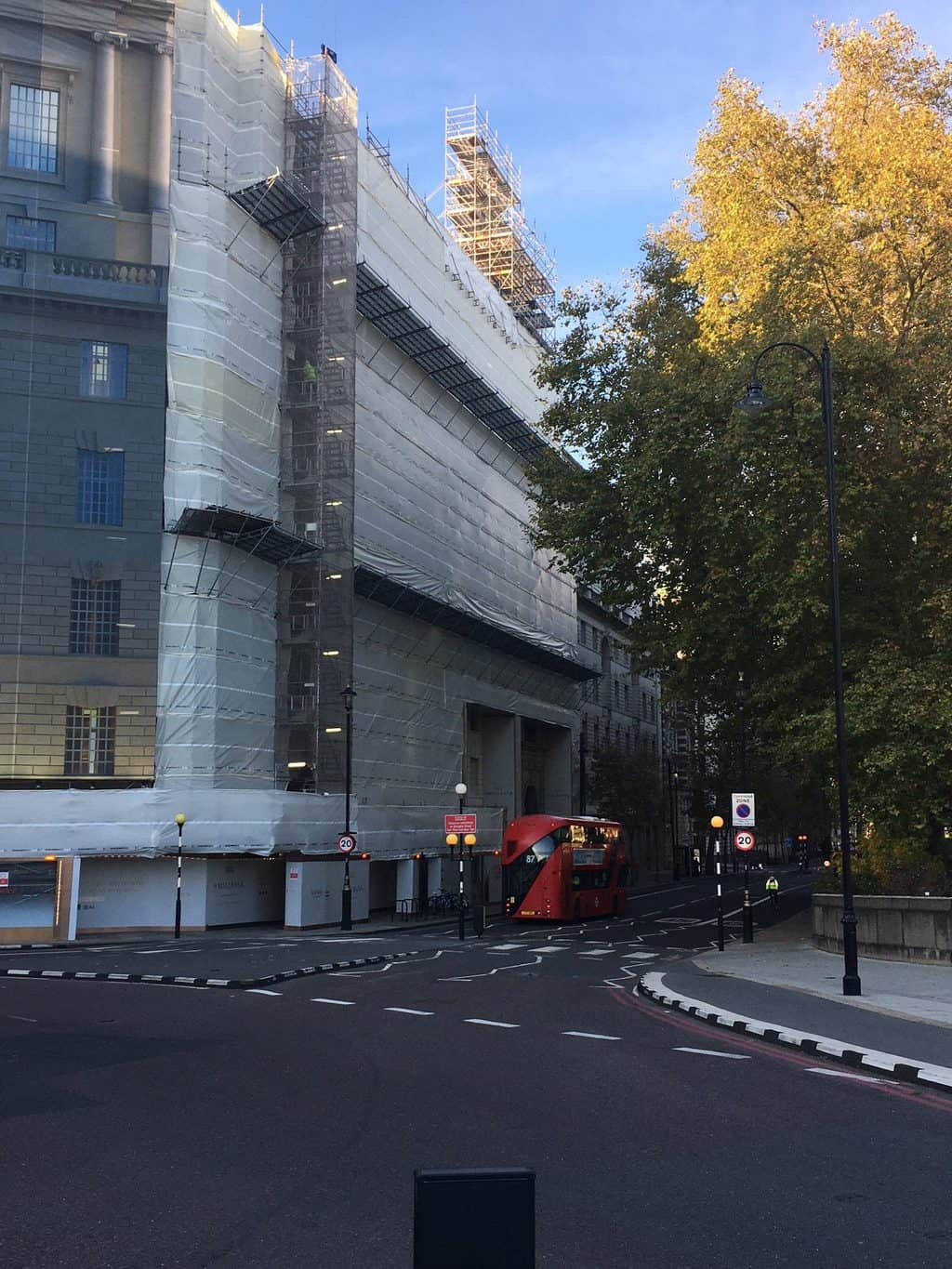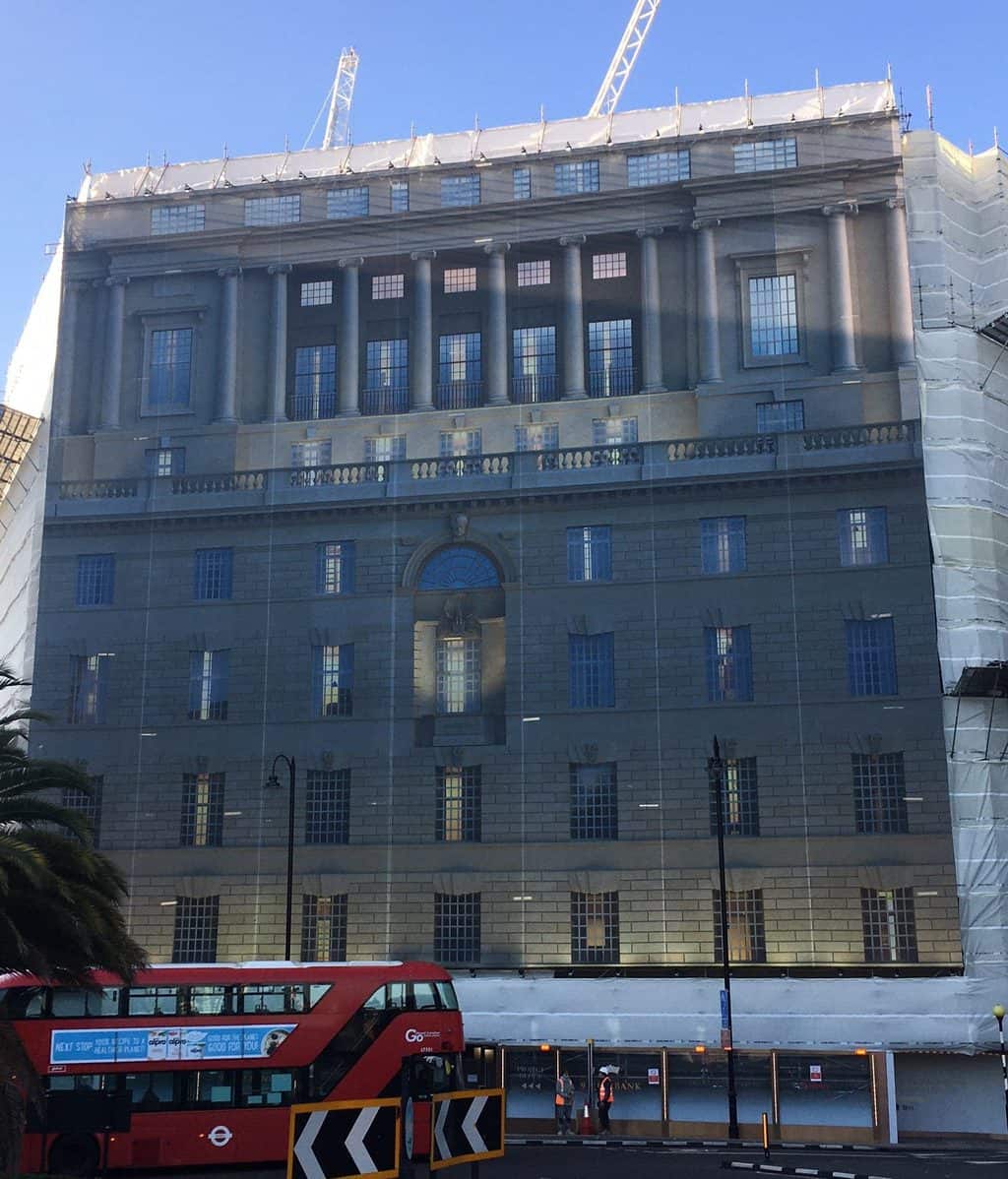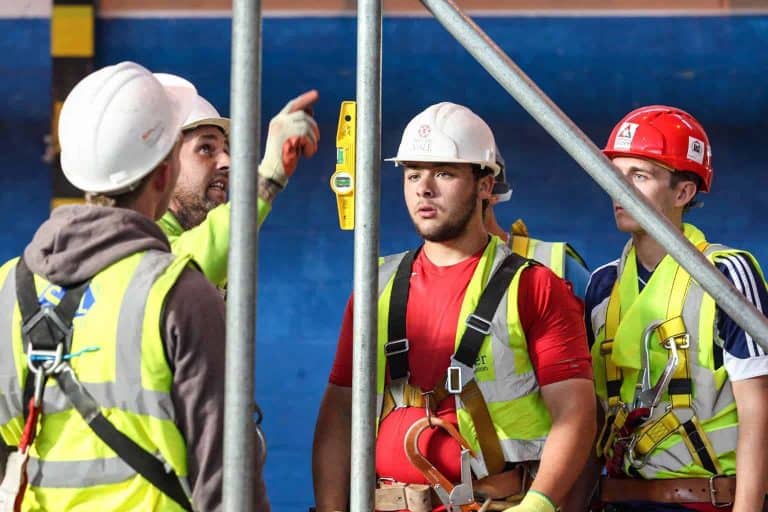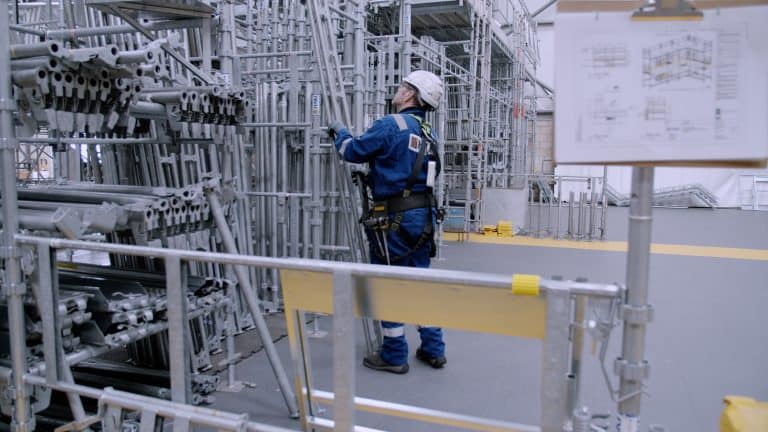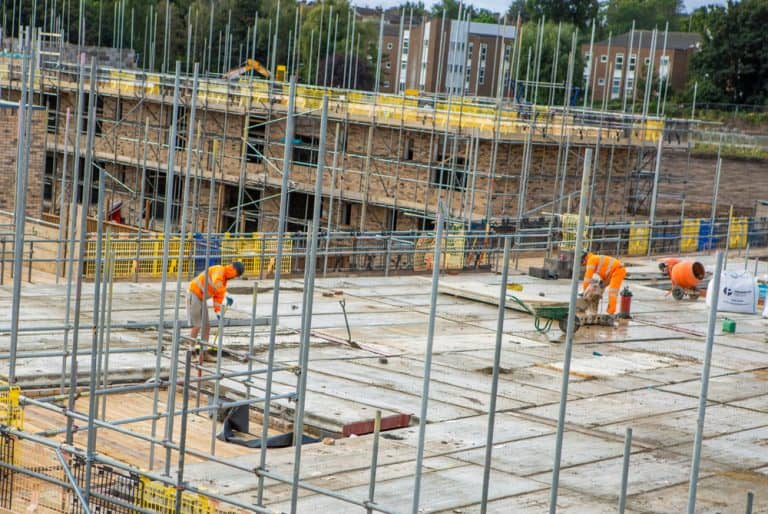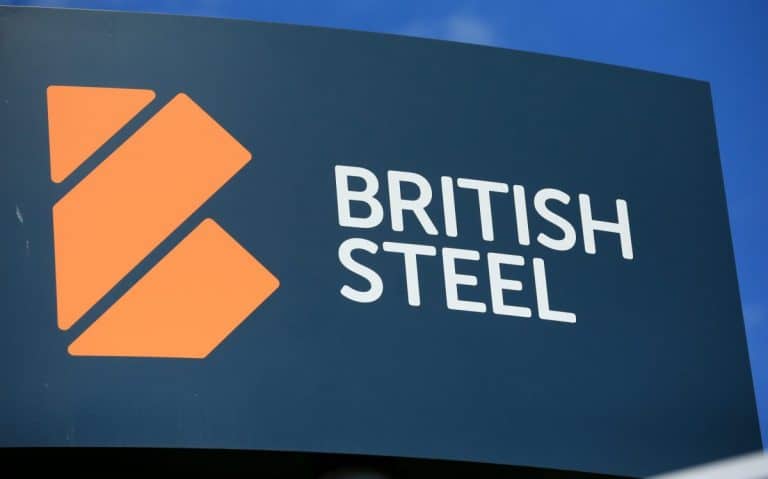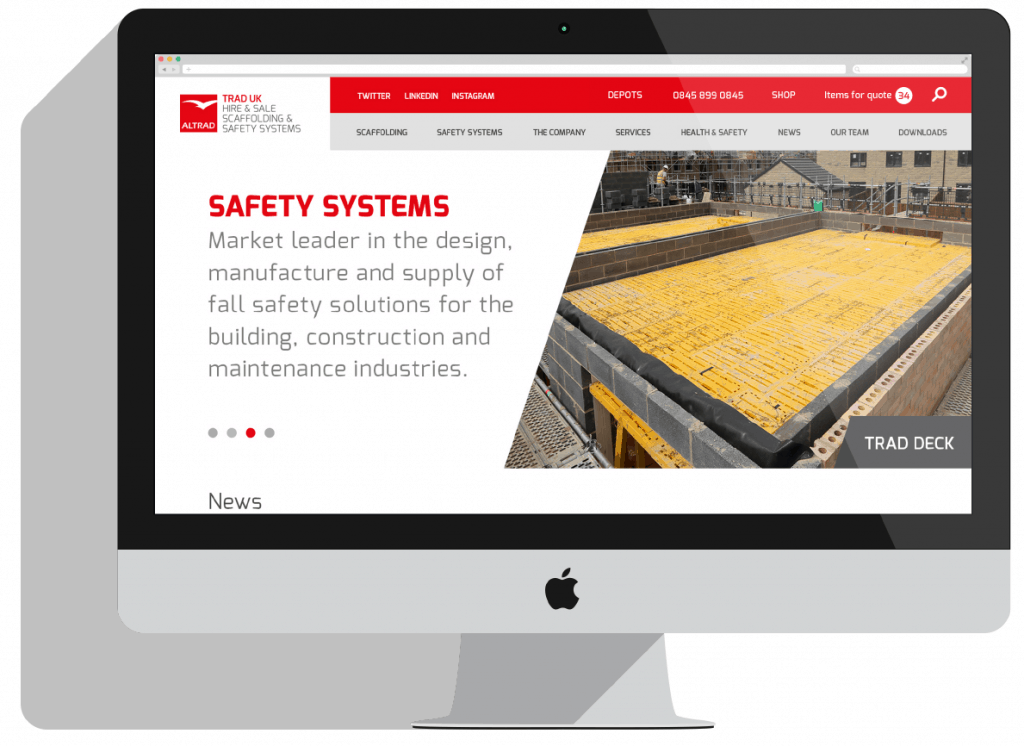TRAD delivers Millbank project during COVID restrictions
Using PLETTAC Metrix system TRAD Scaffolding Contractors (TRAD) has completed the erection stage of work on 9 Millbank, a busy central London development managed by St Edwards Homes.
TRAD was engaged by the client late last year to provide the complete scaffolding package for the development of the former government-owned building.
The original building was partly demolished, and the remaining Grade II listed section is currently being refurbished. Phase 2 of the works is a new build section which retains the traditional look of the existing building and is set to become a highly desirable luxury residential centrepiece within our client’s portfolio.
Gracing the banks of the River Thames at the heart of historic Westminster, the stunning location has The Houses of Parliament, Westminster Cathedral and Big Ben within its gaze.
TRAD Scaffolding has recently completed the refurb and new build elements of the project, in a contract worth more than £2m, using its own highly adaptable and impressive Plettac Metrix system scaffold.
Working to strict deadlines and in one of the busiest locations in London the team worked around the clock to quickly deliver a stunning looking scaffold envelope incorporating some 2000 tons of brand-new equipment.
The on-site team, led by senior Black Hat foreman Scaffolder Nigel Garner, worked very closely with their design team, TRAD contracts management and the client to deliver the scaffold safely and to a very precise and high standard.
TRAD Scaffolding Managing Director Peter McShane said: “I have visited the site regularly during the build process and I have to say every time I’ve approached the project the scaffold has stood out aesthetically. The team has done a great job here and they should all be hugely proud.”
TRAD, with the support of the St Edwards Homes team, has also taken the opportunity to introduce several apprentices – male and female – along the way. Closely managed by their site team they have made very positive contributions and have experienced working on a large and important development project.
Peter McShane added: “St Edwards Homes has been very supportive of our apprentices being involved in the project. They recognise that these young people are the future of our industry and I’ve been really pleased with the progress I have seen from our apprentices on site.”
With a large proportion of this project delivered during Covid lockdowns the team has maintained programme safely, within budget and been fully aware of the health and wellbeing of its own team, other teams on-site and the general public.
Dismantle is due to start shortly and the TRAD team are all looking forward to seeing the full reveal over the coming months.
CISRS brings clarity with wording change
The Construction Industry Scaffolders Record Scheme (CISRS) is set to change the wording for endorsements on the rear of all new CISRS cards in a bid to bring clarity to the card system.
From the 1st February 2021 the wording of certain endorsements and the order in which they appear will change on most CISRS cards issued. The first endorsement on all cards will show the card category. Any following endorsements will show additional training modules and qualifications held by the cardholder at the date the card was issued. Endorsements showing the route of achievement for Scaffolder and Advanced Scaffolder cards will now no longer appear on the new cards. The change comes after a steady influx of courses and qualifications now offered by the record scheme such as CPD, SSPTS, System Inspections and the like, the rear of the cardholder’s card was becoming pretty overcrowded, CISRS said. Recently CISRS has seen some instances mainly with scaffolding instructors who have had to be issued 2 cards due to the sheer number of endorsements they hold. CISRS Managing Director, David Mosley said: “The card endorsement listings change is basically about space and clarity. We think this is a clearer way to show that the individual has met the relevant criteria to hold a particular card at a certain level e.g. Scaffolder, Advanced. We felt it was more important to highlight any additional endorsements the person may have e.g. SSPTS Layher rather than the route to qualification e.g. COTS Pt1, Pt2 VQ etc.” The authenticity of all CISRS cards can be checked by calling the CISRS helpline on 0844 8157223 or emailing [email protected]. Or alternatively, you can use the NOCN online CISRS card checker by clicking HERE.Lee Marley apprentices continue training despite COVID challenges
Scaffolding and construction company Lee Marley Brickwork has responded to COVID challenges with a revised training plan allowing apprentices to continue their valuable training.
With colleges and training establishments being closed across the country Lee Marley Brickwork (LMB) has been continuing its coaching efforts with scaffolding apprentices on-site so they don’t miss out on their practical training due to Covid restrictions.“During the first Covid lockdown, it became clear that our apprentices would not receive the same theory and practical training they would have done at college and on-site”, Christian Hatherall-Good, Apprentice Training Manager at LMB told Scaffmag.
“This lockdown, with colleges being closed, we developed a revised training plan, so our apprentices do not miss out on either the theory or practical side of their training.”

Christian joined LMB last Summer, since then his role has been to support and teach the apprentices on-site. The restrictions placed in education has meant that students will not be allowed to attend until at least the end of February.
The company has been mindful that their apprentices don’t miss out on very valuable practical time and have responded to the situation.
Christian continues to visit the apprentices on-site in controlled and socially distanced conditions in order to carry out teaching and provide guidance to the apprentices while they work. The apprentices are usually placed in pairs on projects.
Many of the firm’s current apprentices are from Brooklands College where Christian worked as Head of Construction Curriculum and as a bricklaying tutor before he joined LMB last year. He has been working closely with the new tutor at Brooklands College and between both parties a plan for training the apprentices has been developed.
New Training Plan
As part of LMB’s new training plan, a Google classroom group has been set up for each level of apprentice group. Across each classroom, a wide a range of resources has been developed. These consist of ‘how to’ videos that the tutor filmed previously, Workbooks, PowerPoints, scenario assignments, worksheets and revision quizzes.
On the apprentices’ usual college day, they attend at least two, one-and-a-half-hour theory sessions on Google MEET’s group video call with their tutor. All links are placed on their Google classroom with the necessary resources needed the day before.
LMB says Christian has also organised a one-to-one review session for each apprentice on Google MEET’s with their tutor and on-site assessor. The aim being to check on the student’s wellbeing, work progress, targets and to provide advice on any work they needed help with.
The apprentices continue to have remote learning from the College tutor and from the Training Manager on their usual college day.
There’s nothing stopping these construction students!

Scaffold Director Daniel Cooke added: “Within any industry, the importance of training and helping individuals on their career path from the bottom up is so critical in the everyday running of a business. Our success rate has been fantastic!
Today we have guys that have completed their apprenticeship and are very happy with continuing a career with us. At present we have 12 scaffolding operatives at various stages of their apprenticeship, and I am very proud of all of them.
One of our apprentices, Conor Carolan, has recently completed his apprenticeship. He has spent a great deal of time working on our Park Royal project and has helped with the scaffold erection and dismantle across multiple phases including the 27-storey high tower that has a white box feature on top taking it to 29 floors in the air.”
Lee Marley Brickwork Ltd currently offers both brickwork and scaffolding apprenticeships in order to bring the next generation of tradesmen into the construction industry.
To find out more about apprenticeship and careers opportunities at LMB please email [email protected]
Firm and boss fined after two workers fall from scaffold tower
A north-west roofing supplies firm and its director have been fined after two workers fell from a scaffold, sustaining serious injuries.
Manchester Magistrates’ Court heard how in November 2018, two employees of Rooffabs Direct Ltd had been working with the firms boss Paul McMahon, the sole director of the company, to install signage at retail premises in Prestwich.
The workers used a tower scaffold to carry out the work. During the afternoon, when their boss was no longer on-site, the tower scaffold moved away from the building and the two employees fell approximately two metres, suffering fractures to their legs and ankles.
An investigation by the Health and Safety Executive (HSE) found that the tower scaffold had not been erected by someone with suitable training.There were missing guard rails on the scaffold and no outriggers in place at the time of the incident. The company also failed to report the incident as required by the Reporting of Injuries, Diseases and Dangerous Regulations 2013 (RIDDOR).
Rooffabs Direct Limited pleaded guilty to breaching the Health and Safety at Work etc. Act 1974 and the Reporting of Injuries, Diseases and Dangerous Regulations 2013. The company was fined £20,000. The firms boss Paul McMahon, pleaded guilty to breaching the Health and Safety at Work etc. Act 1974 and of the Reporting of Injuries, Diseases and Dangerous Regulations 2013.He was ordered to complete 100 hours community service, pay compensation orders of £500 each for the two injured persons and was ordered to pay costs of £1,000.
Speaking after the hearing, HSE inspector David Norton said: “Falls from height remain one of the most common causes of work-related fatalities and severe injuries in this country. The risks associated with work at height are well known. “This incident could so easily have been avoided by having a suitably trained person put up the tower scaffold and ensuring that the required guardrails and outriggers were in place.”Young people receive 100s of new starts in scaffolding
Members of the NASC are providing more than 290+ 18-24-year-olds across the UK with scaffolding industry experience through the Government’s Kickstart Scheme, which officially launches today.
A total of 50 NASC scaffolding contractors and suppliers have signed up to the Kickstart Scheme through the UK scaffolding trade body. Each company has committed to providing six-month work placements to out of work young people. The NASC says the vast majority of these firms will take on more than one candidate under the Scheme, with a handful providing 20+ positions, helping to push the combined total of vacancies to 294. Henry Annafi, NASC Training Officer, who successfully co-ordinated the NASC’s gateway organisation bid and will support the 50 NASC members through the Scheme, said: “I am absolutely delighted but not surprised by the fantastic interest and take-up of the Scheme by NASC members. “These members are as committed to training and recruitment as the NASC is as the UK trade body for the scaffolding industry and I’d like to applaud each and every one of them for their effort and enthusiasm to date. “Through my conversations with these members it’s become clear that they’re all intending to go well beyond the parameters of the Scheme and will look to place all successful participants on apprenticeships or full employment once the six-month placement ends. “There’s a long-term commitment being made and that’s because the members aren’t just keen to provide young people with short-term jobs, they want to give them a career.” The Kickstart Scheme provides funding to employers to create new job placements for young people on Universal Credit who are at risk of long-term unemployment.
HAKI slashes CISRS training costs
HAKI is offering a substantial discount on its CISRS BASE courses in January and February.
System scaffolding firm HAKI is offering 15% off its 5-day CISRS BASE that will teach participants how to erect, alter and dismantle simple scaffold structures up to 6m high. The course aligns itself with the organisation’s mission to open up career opportunities, improve skills in the industry and assure safety. The company is offering 15% off the course for any delegate who signs up for a February or March 2021 programme in January and February 2021. Usually valued at £585 (ex. VAT) the discount means participants will pay only £497.25 – a saving of nearly £100! Over the 5-day programme, delegates will learn about HAKI’s products. They will also learn how to safely construct simple structures through a series of theory and practical assessments. After completing an end-of-course theory test participants will receive a CISRS BASE certificate, where HAKI will apply on their behalf for a CISRS BASE card. This card permits non-scaffolders to construct HAKI structures up to a maximum height of 6m, providing they are not in an environment with a general public interface. Chris Partridge from HAKI Training Centre says: “Our BASE course is ideal for small housebuilders, roofing and double-glazing companies who often lose money due to the delay in waiting for the scaffolders to return to base out or erect the next lift. This qualification allows professionals to erect the HAKI universal system scaffold themselves to suit the progress.” HAKI can be hired or purchased from Enigma. The first 5-day course launches on 1st February 2021. It is currently live and available for booking. Details are found at: https://www.haki.com/services/Construction output set to rise 14% this year
Industry experts are predicting a 14% rise in construction output in 2021 and a 4.9% increase in 2022.
The Construction Products Association (CPA) has announced that construction will see a ‘W’-shaped economic recession and recovery. Their assumption takes into account the new lockdown restrictions overwinter 2020/21 before a sustained recovery from 2021 Q2 as vaccines are rolled out and the services-based economy can reopen again. The CPA say, while some sectors of construction are dependent on consumer and business confidence returning, construction activity has largely been able to bounce back quicker than the overall economy. “With the government making it clear that the construction and manufacturing sectors should continue to operate despite Covid-19 restrictions, output has been able to rise and recover relatively rapidly.” The 14.0% rise in 2021 follows an estimated contraction of 14.3% overall in 2020 caused by the sharp fall in the first half of last year. However, the CPA warned that output is only expected to recover to pre-Covid levels in 2022. There is also the risk that once the furlough and self-employment support schemes end in April, there may be a sharp rise in unemployment that could potentially dampen this recovery. the CPA’s Economics Director, Noble Francis, said: “The spectre of a ‘No Deal’ Brexit that would have badly affected the UK economy and construction in the short term has been avoided but questions over the long term impact of Covid-19 on the structure of the economy still remain. This continues to leave questions about the fortunes of certain construction sectors. This is most notable in the commercial sector, where there is still lots of uncertainty about the future of retail and office space. It will be crucial to observe how businesses change their operations as the vaccine is rolled out in the coming months and to what extent there is a ‘return to the office’. “While the fortunes of some sectors have been tied to Covid restrictions and associated business and consumer confidence in the wider economy, infrastructure has largely escaped such uncertainty. Projects have been able to effectively enact safe operating procedures given the sector’s large construction sites that have fewer different trades mixing than in most sectors. As such, infrastructure has been least-affected by Covid restrictions and output is expected to lift the whole industry over 2021 and 2022. Main works on HS2, Europe’s largest construction project, along with offshore wind and nuclear projects are expected to be the main drivers of activity.”Scaffolders take strike action over pay
The British Steel site in Scunthorpe faces disruption next week as scaffolders at the plant begin strike action in a dispute over pay.
The 50 plus scaffolders employed by Brand Energy, who are members of the construction union Unite, are responsible for the maintenance of over 500 scaffolding structures at the Scunthorpe site. The dispute is over pay that began in 2019. The scaffolders are seeking to be paid in line with the National Agreement for the Engineering Construction Industry (NAECI). There is a difference of £2.00 an hour between their current pay rates and the established NAECI pay rates. According to Unite since 2019, Brand Energy has refused to engage with the union over the pay dispute, leaving them with no option but to ballot for strike action. The scaffolders involved delivered a resounding 100 per cent yes vote in favour of strike action. Unite has called a total of six days of strikes over the coming weeks, with the first 48 hour strike beginning on Monday 25 January at 05:30. Strikes will also take place on Monday 1 February until Wednesday 3 February and Monday 8 February until Wednesday 10 February.
Socially distanced picket lines
The scaffolders will be maintaining a strictly socially distanced picket line at the site, which is likely to cause disruption to the overall operation at British Steel, Unite said. The dispute is made more complex as Brand Energy will lose the scaffolding contract on 15 February when it will transfer to Activo. If the matter is not resolved before the contract is transferred, Unite will begin balloting for fresh industrial action with Activo, once the contract transfers. Unite regional officer John McIntyre said: “Our members have been left with no choice but to take strike action due to the refusal of Brand Energy to even engage with Unite on the pay issue. “There are clear pay rates established for this type of highly skilled work and Brand Energy are deliberately undermining them. “Our members play a crucial role maintaining safety on the British Steel site and deserve to be paid the correct rate for the job. “Strike action will inevitably cause considerable disruption across the site but this dispute is solely of Brand Energy’s making and even at this late stage strike action can be avoided, if Brand Energy agree to pay the correct rate. “If this matter is not resolved by the time Brand Energy loses the contract then it is only right and fair to inform the new contractor Activo that preparations for renewed industrial action will begin when they inherit the contract.”TRAD UK launches new website
The new site allows TRAD UK customers to raise quotes online and see all its products in one place.
TRAD UK, the new brand for the combined TRAD Hire & Sales and TRAD Safety Systems companies, has launched its new website for the trade – now with the full and extensive range of products and services available to customers across the UK.
Bringing all of the company’s products under one roof, the new website makes it easy for customers to view all the safety and scaffolding products for sale or hire and includes a new quoting service that allows customers to raise a quote online.
The quote then feeds directly into the relevant Super Depots that TRAD UK now operates around the UK, helping to deliver the great customer service that the TRAD Group prides itself on.
Customers will also have direct access to all depot managers and sales representative contacts across the company’s six depots.
“Having merged the two companies earlier in the year, this is a fantastic new site that showcases our vast range of products available for hire or sale,” commented Des Moore, TRAD Group CEO and NASC President 2017-19. “It also gives customers the opportunity to see how our services compare to other providers, demonstrating our significant capability across all scaffolding and access requirements for both the housebuilding and wider commercial construction industries.”
In addition to the online ordering portal, customers will be able to take advantage of a new information section, where all product user manuals and data sheets can be freely downloaded, and the site will also include health & safety guidance, and links to industry-standard advice and guidance. This makes the site a fantastic resource for everyone in the industry.
“It is fantastic to have our new website up and running,” said Colin Dobson, Managing Director at TRAD UK. “This new site is a clear and practical way for our customers to find exactly the equipment and products they need, and to get a quote for hire or sale, as well as accessing key resources to help them work safely and efficiently. Working closely with our depots around the country, the website will help us to operate a smooth search and sales operation for our customers, allowing them to avoid gimmicks and get on with the job efficiently and cost-effectively.”
You can visit the new website now at www.traduk.co.uk


